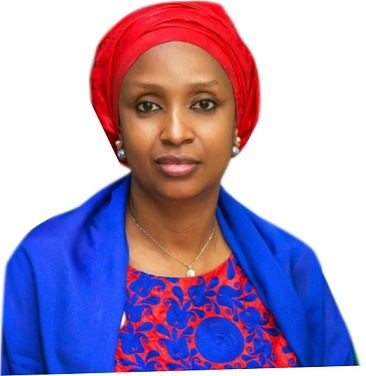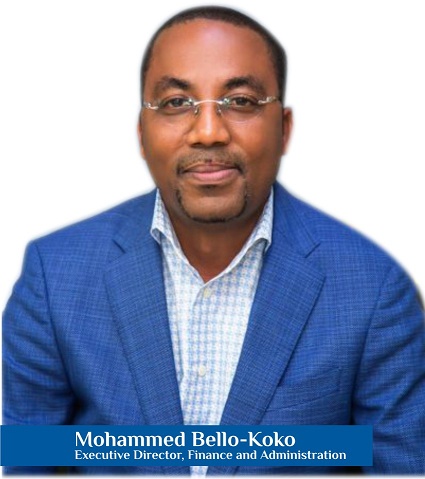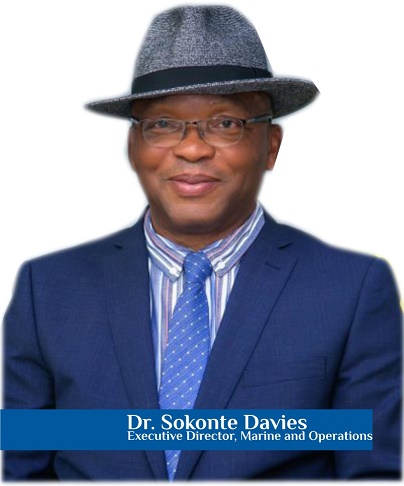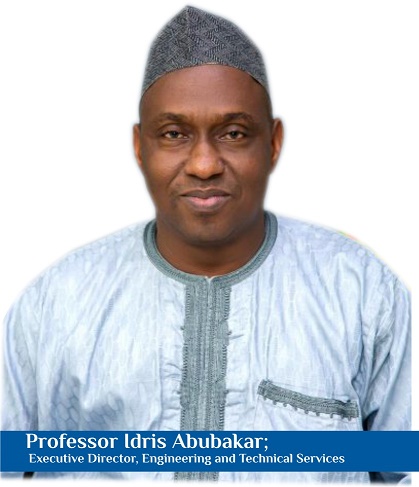There’s a new spirit at the Nigerian Ports Authority that propels the high level of success the organization has recorded in the last three years since the new management came into existence. It is team spirit. That is what Hadiza Bala-Usman introduced at NPA when she was appointed managing director and chief executive officer in July, 2016. It is what has enabled her to break new grounds in a position she wasn’t given any chance of succeeding on account of her gender.
President Muammadu Buhari’s appointment of Hadiza Bala-Usman as managing director of the Nigerian Ports Authority (NPA) on July 11, 2016 took many by surprise. She had been relatively unknown until she shot to national limelight shortly after more than 200 female students of the Federal Government Girls College, Chibok, in Borno State, were abducted by Boko Haram insurgents in April, 2014.
She, alongside former education minister, Oby Ezekwesili and Aisha Yesufu formed the Bring Back Our Girls Group to mount pressure on the government of then president, Goodluck Jonathan, to rescue the school girls from the captivity of the terrorists. Hers was a familiar face among the men and women who gathered at the Unity Fountain, Abuja, every day to chant, “Bring back our girls, now, and alive”, igniting a campaign that soon assumed an international dimension.
On the coming to power of the All Progressives Congress administration both at the federal and state (Kaduna) level in 2015, Bala-Usman got appointed by Governor Nasir el Rufai as his chief of staff. She was still trying to learn the ropes in the high echelon of political office when Buhari snapped her up for the top job at NPA.
Not much was thought of her ability to handle one of the most difficult jobs in the country, considering the strategic position of NPA as one of the nation’s main revenue generators. Many considered her inexperienced for such a sensitive job, made worse by the fact of her gender (no woman had ever headed NPA).
However, more than three years down the road, many who did not believe in her ability to run the agency have been forced to eat their words.
Bala-Usman would not be drawn into talking much about her performance on what could be regarded as the hot seat at NPA. She would rather such assessment was left to stakeholders in the nation’s maritime industry to make, based on the difference they have since she came into office. She wants others to talk about her performance. But the most important thing to her is the need for one to take his or her job seriously.
It is difficult not to recognize the achievements NPA has recorded from 2016 under the leadership of Bala-Usman. She has had the benefit of working with a dedicated and competent management team with whom she has been on the same page from when she
came into office. And the success has come about because the team keyed into her vision, which aligns with the agency’s vision to be the leading port in Africa.
Catalogue of achievements

What could perhaps be considered Bala-Usman’s greatest achievement so far, one that she herself acknowledges, is her ability to entrench transparency and accountability in the operations of NPA. She signaled her readiness to entrench a new culture of transparency and accountability when she signed a memorandum of understanding (MoU) with BudgIT Open Budget System Platform for the purpose of implementing a programme for dissemination of data from NPA for public consumption. It was the first rime an agency of government would go into such an arrangement.
One of the first actions she took was re-designing of the organizational structure of NPA to allow it to be run in the most cost-effective manner, while at the same time guaranteeing efficiency. She introduced a new management system that runs on a robust reward method to improve employee relations and increase productivity. Attention was also paid to human capital development through training and re-training to improve knowledge, skills and capacity.

Bala-Usman introduced a new licensing regime that guarantees transparency and strict adherence to due process through review of all concession agreements to ensure collaboration of all stakeholders for development of the maritime industry. She established a dedicated port terminal to handle exports that are aimed at diversifying the nation’s economy.
An evidence of the transparency she brought to bear on the operations of NPA could be seen in the fact that she assumed office to inherit a backlog of audited financial statements. The new order she installed ensured the backlog was cleared, such that the agency is up to date in audited financial statements, the last being 2018.
Worthy of mention also is the fact that she worked with her team to establish dedicated terminals such as the Ikorodu Light Terminal for Lagos; Shoreline Logistics Terminal for the Calabar Port: BUA Ports and Terminal, as well as Port and Terminal Operators Limited for the Port Harcourt Port.
In the effort to improve infrastructure at the Lagos ports, NPA signed an MoU with the Federal Ministry of Works and Housing for construction of access roads at the ports. The project is costing N4.34 billion, with NPA contributing N1. 829 billion.
A major achievement of NPA under Bala-Usman was the 2017 collaboration with the Nigerian Customs Service to introduce the Single Window Platform for the purpose of simplifying and harmonizing formalities, procedures and exchange of information and documents among stakeholders in the industry.
Through the far-reaching reforms introduced by Bala-Usman, NPA has been able to restore investor confidence in Nigerian ports. Some of the investors are the China Harbour Engineering Company, which took up the balance of NPA’s equity in the Lekki Deep Seaport; Josepdam, with whom NPA signed a partnership agreement, as well as Tanger Med of Morocco, which has indicated willingness to develop a greenfield terminal logistics base in the country.
Balal-Usman has worked with her team to demystify governance and make it possible for stakeholders to understand what the agency does. This has placed the organization in a position to ensure full compliance on regulations and third party contractors who were hitherto not doing so or meeting contractual obligations.
Her leadership has inaugurated the Command and Control Communication and Intelligence Centre (CCCIC) for NPA. The platform serves as information centre for all security agencies operating at the ports, and also conducts surveillance of activities that take place there.
The agency has also been able to launch the provisional, final billing and customer module of revenue invoice management system that seeks to improve service offering and partner relationship, and also create an efficient payment method. This also allows for revenue maximization while eliminating losses that are related to revenue leakages.
The agency, under Bala-Usman and her team, has in the last three years acquired four new tug boats – MT Daura, MT Ubima, MT Uromi and MT Majiya – for enhancement of operational efficiency. It has also established and put in place a level playing field for all those operating at the nation’s ports. This, the agency has been able to do, by removing bottlenecks that do not allow for healthy competition in the industry. For instance, NPA has declassified port terminals, thus eliminating categorization of ports which gave some the status of oil and gas ports.
In the area of revenue generation, one of the areas where the current management team has made significant difference is contribution to the Consolidated Revenue Fund (CRF). At the time Bala-Usman assumed office, NPA made a contribution of N18 billion. But in the two subsequent years, the agency made a contribution of N30 billion annually. The figures for 2019 are not out yet, by press time, but there are indications that they will, at worst, maintain the same trend, if not higher.
Ease of doing business
Bala-Usman has worked with her team to enhance the ease of doing business at the nation’s ports in line with an Executive Order signed by Vice President Yemi Osinbajo as Acting President in 2018. As part of efforts to achieve this, NPA is in the process of reviewing tariffs charged by terminal operators, with a view to reducing the cost of doing business at the ports. The agency is working to review concession agreements entered into with terminal operators 11 years ago, in order to bring them in line with international best practices.
“Our port concessions have been a success story”, Bala-Usmna was quoted as saying. “We need to acknowledge that the landlord model that has been in place over the last 11 years has been successful. But we are working to review the concession agreements, as we have said. There are various sections of the agreements that are not being adhered to”.
The Bala-Usman led management team is working to reposition the nation’s ports through improvement in infrastructure to bring them in line with what obtains in other parts of the world. Part of the repositioning is the effort to partner the Nigerian Railway Corporation for re-introduction of rail traffic to ease movement of goods out of the ports.
“Regarding infrastructure, we are keen on ensuring that our rail lines from the ports to the hinterland function”, Bala-Usman said. “We want to prioritize the evacuation of cargo using rail. We have had discussions with the Nigerian Railway Corporation. We are going to continue on that, and we believe that a percentage of our cargo should be evacuated using rail lines”.
Fight against corruption
Bala-Usman has got her team on the same page with her in her effort to rid NPA of corruption that tainted its image in the past. Since coming into office, she has been relentlessly waging a war against practices that tend to shortchange the federal government in any way.
“A lot of the corrupt practices that we have identified with the port operation are attributable to certain contractual obligations the NPA has entered with entities whereby the federal government is shortchanged”, she said. “We are working at reviewing such agreements and we are working on terminating some of the agreements. We have reached out to the relevant agencies and communicated our position on this”.
She said: “For every corrupt practice that we identify we forward to the EFCC to investigate and determine what prosecution process they will embark upon. When we identify a legal concern whereby there is a lack of clarity on the role of government or there is a seeming disadvantage that has been provided to the Nigerian people, we have forwarded to the attorney general to provide legal guidance on how we can exit some of these relationships”.
The Dream Team

Hadiza Bala-Usman; Managing Director/Chief Executive Officer
Hadiza Bala-Usman heads the dream team that runs NPA as managing director and chief executive officer. She holds a BSc degree in Business Administration from the Ahmadu Bello University, Zaria and a Master of Arts degree in Development Studies from the University of Leeds, United Kingdom.
She started her working career with the Centre for Development and Research Training, Zaria, a non-governmental organization, as a research assistant from June 1999 to June, 2000. She worked as an enterprise officer at the Bureau for Public Enterprise from June, 2000 to August, 2004, and was hired by the United Nations Development Programme as special assistant on project implementation to the Minister of the Federal Capital Territory from October, 2004 to January, 2008.
Bala-Usman was appointed chief of staff to the Kaduna State governor in July, 2015, a position she held until her current appointment.
She was a member of the All Progressives Congress (APC) Strategy Committee from January to December, 2014. The committee defined the policy thrust of the party and subsequently drew up its manifesto. She served on the party’s National Elections Planning Committee (the committee that developed the party’s election winning strategies) from June, 2014 to April, 2015, and also doubled as the administrative secretary of the party’s Presidential Campaign Committee from January to April, 2015.
She was a member of the Presidential Inauguration Planning Committee for the incoming Buhari administration from April to May, 2015. Her first appointment by Buhari was as a member of the Presidential Advisory Committee on Anti-Corruption in September, 2015.
Bala-Usman was named by Financial Times among the Most Influential Women of 2014; named by CNN among the Most Inspiring Women of 2014 and among Ebony Magazine’s 100 Most Influential Black Women of 2014.

Mohammed Bello-Koko; Executive Director, Finance and Administration
Mohammed Bello-Koko, executive director in charge of finance and administration at NPA, holds a BSc degree in Management Studies from the University of Sokoto. He obtained an MBA from Usman Dan Fodio University, also in Sokoto.
He started his career at FSB International Bank Plc in Port Harcourt as an executive trainee, banking operations, from 1996 to 2004. He held several positions in the bank, including banking officer, credit; senior banking officer, senior treasury officer, senior banking officer, energy sector, in charge of oil and gas related multinational accounts and sub-contractors.
Bello-Koko was assistant manager (credit and marketing, and later, deputy manager, branch manager and marketing manager in handling initiation, processing and monitoring of good quality risk assets, management of existing accounts and providing leadership training.
He joined Zenith Bank Plc in 2005 as a manager-team head, public sector and large corporates. He was subsequently senior manager and head, public sector group; assistant general manager and zonal head on which position he was group head for public sector, as well as zonal head in charge of branches in the Rivers and Bayelsa zones of the bank. He was deputy general manager and zonal head, a position that made him a member of the bank’s executive management team.
Bello-Koko won many recognitions and awards because of his outstanding performance at Zenith Bank. They include Second Most Profitable Branch; Best Revenue Generation (South South), in 2009; Best Branch in Deposit Mobilization (South South), 2009; Best Group OGR and Taxes Collection Bank-wide, 2012 and Most Profitable Branch, 2015.
He is a member of the Nigerian Institute of Management and the Institute of Strategic Management. He has attended several courses within and outside the country.

Dr. Sokonte Davies, Executive Director, Marine and Operations
Dr. Sokonte Davies is the executive director, marine and operations at NPA. He attended the Rivers State University of Science and Technology, Port Harcourt, from where he obtained his bachelor’s degree in 1984. He proceeded to the Belorussia Agricultural Academy, Belarus, from September, 1984 to March, 1987, and then the Crimea M.I. Kalinin Agricultural Institute, Ukraine, for his master’s degree in Economics, in 1989. He attended the South China Agricultural University, China, where he obtained a PhD in Economics and Management in June, 2000.
He was a member of the House of Representatives from June, 2007 to June, 2015, and served as deputy chairman, House Committee on Land Transportation, from June, 2011 to June, 2015.
Davies had before then worked as strategic planner and business analyst for Sungrace Investment Company in Guangzhou, China, in 2000. He was chief executive officer, Seivad Global Resources, Port Harcourt, in 2002; executive director, Public Policy and Leadership Centre, also in Port Harcourt, in 2002. Before then, he had been director, Grassroots Political Development Centre, Port Harcourt., from January, 2001 to June, 2007.
He was director, Directorate of Finance and Administration for APC’s Presidential Campaign Organization before his current appointment.

Professor Idris Abubakar; Executive Director, Engineering and Technical Services
Professor Idris Abubakar, executive director, engineering and technical services at NPA, holds a Bachelor of Science and Master’s degrees, as well as a PhD, all in civil engineering, in 1993, 1999 and 2005 in that order from the Ahmadu Bello University, Zaria.
He started his academic career at his Alma Mata as an assistant lecturer in 1995, becoming Lecturer II in 1999, Lecturer I in 2004, senior lecturer in 2007 and reader in 2010. He became a professor in 2013.
While at Ahmadu Bello, Abubakar held several positions including acting director, Estate Department, in 2006; assistant dean, Faculty of Engineering, from 2007 to 2010, head of Department of Civil Engineering, from 2010 to 2014. He was a member of the Presidential Projects Assessment Committee, from March, 2010 to May, 2011. He was director of projects, ABUCONS Limited, before his appointment as executive director, engineering and technical services at NPA.
Abubakar has several publications to his name in high profile peer reviewed journals, conference proceedings and technical papers.





